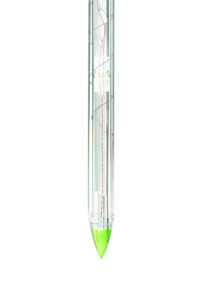Πληροφορίες προϊόντος
The HI99121 is the perfect portable pH meter for soil testing. With the HI99121 and HI12923 direct soil pre-amplified pH and temperature probe, users can test both the pH of soil directly or after preparation of a soil slurry with deionized water.
The HI12923 features a conical, rugged tip that can be directly inserted into moist or soft soil. For harder soils, the kit includes a plastic auger to perforate the ground.
- Automatic Temperature Compensation
- Automatic Two-Point Calibration
- Waterproof
Details
Refillable electrode

Turn cap to create positive head pressure allowing for more reference electrolyte to flow.
Amplified Electrode
Fast, stable response that is immune to electrical noise due to humidity.
Soil can be acid, neutral or alkaline, according to its pH value. Most plants prefer a pH range from 5.5 to 7.5; but some species prefer more acid or alkaline soils. Nevertheless, every plant requires a particular range of pH, for optimum growth.
pH strongly influences the availability of nutrients and the presence of microorganisms and plants in the soil. For example, fungi prefer acidic conditions whereas most bacteria, especially those supplying nutrients to the plants, have a preference for moderately acidic or slightly alkaline soils. In fact, in strongly acidic conditions, nitrogen fixing and the mineralization of vegetable residual is reduced. Plants absorb the nutrients dissolved in the soil water and the nutrient solubility depends largely on the pH value. Hence, theavailability of elements is different at different pH levels.
Each plant needs elements in different quantities and this is the reason why each plant requires a particular range of pH to optimize its growth. For example, iron, copper and manganese are not soluble in an alkaline environment. This means that plants needing these elements should theoretically be in an acidic type of soil. Nitrogen, phosphorus, potassium and sulfur, on the other hand, are readily available in a pH range close to neutrality. Furthermore, abnormal pH values, increase the concentration of toxic elements for plants. For example, in acid conditions, there can be an excess of aluminum ions in such quantities that the plant cannot tolerate. Negative effects on chemical and physical structure are also present when pH values are too far from neutral conditions (break up of aggregates, a less permeable and more compact soil).
The HI99121 meter features a large multi level LCD screen which displays both pH and temperature readings simultaneously with 0.01 pH resolution and an accuracy of ±0.02 pH. The LCD screen also has indicators for calibration status and stability, as well as on-screen tutorial messages. The HI99121 has many advanced features that are found in more expensive portable instrumentation including automatic calibration, buffer recognition,and temperature compensation. The battery percent level is displayed at start up alerting the user to the remaining battery power that is available. The supplied HI12923 is a glass body, amplified pH electrode with a built-in temperature sensor designed specifically for measuring the pH in soils.
Features at-a-glance
- Automatic Temperature Compensation
- One or two-point automatic calibration
- BEPS – Alerts the user of low battery power that could adversely affect readings
- Compact, heavy-duty, and waterproof
- Battery % displayed on start-up
- HELP feature, displays messages on LCD
For high accuracy and ensure the soil is wet use the HI7051M soil preparation solution.



